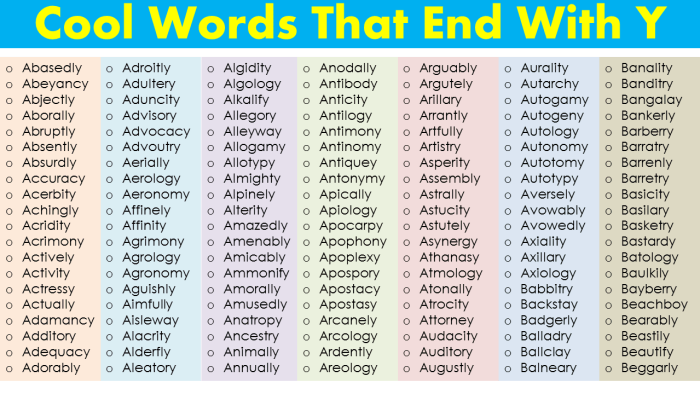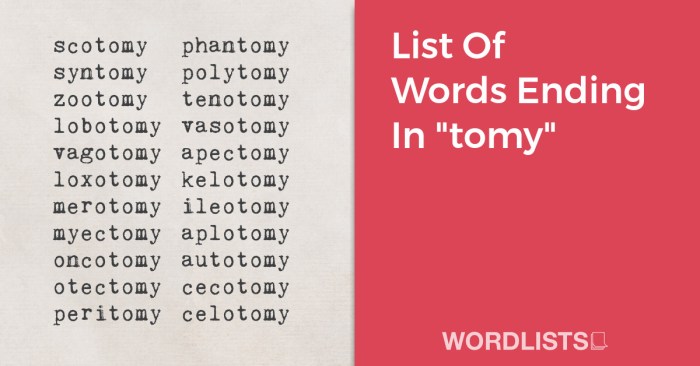Words that end in tomy – Words that end in “tomy” invite us on an intriguing linguistic journey, revealing a world of medical procedures, non-medical terms, and their captivating presence in literature and art.
From the realm of medicine to the nuances of everyday language, words ending in “tomy” paint a vivid tapestry of meanings and applications, promising an exploration that is both informative and engaging.
Words that End in “tomy”

The suffix “-tomy” refers to the act of cutting or incision into a body part or organ. Words that end in “-tomy” often describe surgical procedures or medical examinations.
Etymology of “-tomy”, Words that end in tomy
The suffix “-tomy” originates from the Greek word “tome,” meaning “a cut” or “an incision.” It is commonly used in medical terminology to denote a surgical procedure that involves cutting or removing a body part or tissue.
Medical Procedures Ending in “tomy”

Medical procedures ending in “-tomy” are surgical interventions that involve cutting or removing a body part or tissue. These procedures are performed to treat a wide range of medical conditions, from cancer to heart disease.
While you’re here, did you know about the pi kappa phi hand sign ? Back to our topic, words that end in tomy usually have Greek origins, such as “anatomy” and “economy”.
The purpose of a “-tomy” procedure is to remove or repair damaged or diseased tissue, improve function, or relieve symptoms. Some common “-tomy” procedures include:
Common Medical Procedures Ending in “-tomy”
| Procedure | Description |
|---|---|
| Angioplasty | Widening of narrowed arteries |
| Appendectomy | Removal of the appendix |
| Biopsy | Removal of a tissue sample for examination |
| Cystectomy | Removal of a cyst |
| Gastrectomy | Removal of part or all of the stomach |
| Hepatectomy | Removal of part or all of the liver |
| Hysterectomy | Removal of the uterus |
| Mastectomy | Removal of the breast |
| Nephrectomy | Removal of a kidney |
| Prostatectomy | Removal of the prostate gland |
| Tracheotomy | Creation of an opening in the trachea |
“-Tomy” procedures can offer significant benefits, such as:
- Removal of diseased or damaged tissue
- Improved function
- Relief of symptoms
- Prevention of further complications
However, like any surgical procedure, “-tomy” procedures also carry risks, including:
- Bleeding
- Infection
- Damage to surrounding tissues
- Complications from anesthesia
- Long-term side effects
The decision to undergo a “-tomy” procedure should be made in consultation with a qualified healthcare professional, who can discuss the potential benefits and risks and determine if the procedure is right for you.
Non-Medical Words that End in “tomy”: Words That End In Tomy

Beyond the medical realm, the suffix “-tomy” finds its way into various non-medical contexts, each carrying unique origins and meanings.
The term “tomy” stems from the Greek word “tomos,” meaning “a cutting.” While this root hints at a surgical connotation, non-medical words ending in “-tomy” often take on figurative or metaphorical meanings.
Etymology and Usage
The suffix “-tomy” often denotes an action or process of cutting or dividing, but its application extends beyond literal incisions. In non-medical contexts, “-tomy” conveys a sense of analysis, dissection, or examination.
- Anatomy:In anatomy, the term “osteotomy” refers to the surgical cutting of a bone. However, “osteotome” is a tool used to perform the procedure, not the procedure itself.
- Linguistics:In linguistics, “phonotomy” is the study of speech sounds, while “morphology” examines the structure of words.
- Botany:In botany, “dichotomy” describes the division of a plant into two equal parts, while “trichotomy” refers to a division into three.
- Philosophy:In philosophy, “epistemology” is the study of knowledge, while “ontology” explores the nature of existence.
- Psychology:In psychology, “psycholinguistics” examines the relationship between language and the mind, and “sociotomy” investigates the division of a society into different groups.
Literary and Artistic Expressions

Words ending in “-tomy” have found their way into the realm of literature and art, adding a layer of depth and specificity to the portrayal of characters, emotions, and experiences.
In literature, these words can evoke a sense of medical precision or scientific detachment, often employed to describe the intricate workings of the human body and mind. For instance, in George Orwell’s “Nineteen Eighty-Four,” the protagonist Winston Smith undergoes a “craniotomy,” a procedure that involves opening the skull.
This word choice underscores the invasive and dehumanizing nature of the procedure, emphasizing the totalitarian regime’s disregard for individual autonomy.
Conveying Emotions
Beyond their medical connotations, words ending in “-tomy” can also convey a range of emotions. The suffix itself carries a sense of precision and finality, which can be harnessed to evoke feelings of catharsis, release, or resolution. For example, in Emily Dickinson’s poem “Because I could not stop for Death,” the speaker experiences a “psychache” as she contemplates her own mortality.
This word choice suggests a profound emotional wound, a deep-seated pain that cannot be easily dismissed.
Shaping Literary and Artistic Works
The use of words ending in “-tomy” can significantly shape the tone, atmosphere, and overall impact of literary and artistic works. By incorporating these words into their narratives, authors and artists can create a sense of scientific detachment or emotional intensity, depending on the context.
In the novel “Brave New World” by Aldous Huxley, the term “lobotomy” is used to describe a procedure that removes a person’s capacity for independent thought and emotion. This word choice serves as a powerful metaphor for the dehumanizing effects of the dystopian society portrayed in the novel.
Query Resolution
What is the origin of the suffix “-tomy”?
The suffix “-tomy” originates from the Greek word “tome,” meaning “a cutting.” It is commonly used in medical procedures to indicate an incision or surgical removal.
Can you provide some examples of non-medical words that end in “-tomy”?
Sure! Non-medical words that end in “-tomy” include “anatomy,” “economy,” and “autonomy.” These words have diverse meanings and origins, reflecting the versatility of the suffix.
How do words ending in “-tomy” contribute to literary and artistic works?
In literature and art, words ending in “-tomy” can create specific effects or convey emotions. For instance, the word “autotomy” in literature might suggest self-mutilation or a character’s inner turmoil.